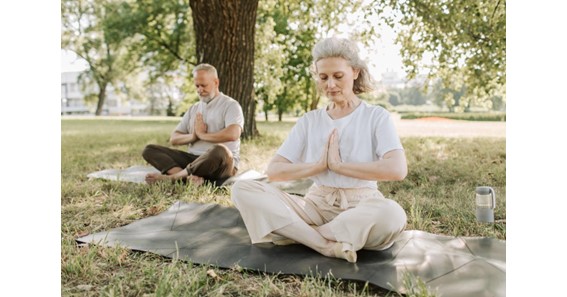As we enter the golden years of our lives, it becomes increasingly important to prioritize our health and fitness. The aging process brings with it a host of unique challenges and changes, from the decline in physical capabilities to the onset of age-related health issues. However, with the right approach and mindset, we can mitigate these challenges and lead fulfilling and active lives well into our senior years.
Research shows that maintaining good health and fitness can play a critical role in the well-being and quality of life of seniors. They can begin their journey by keeping their health and fitness levels in check. A healthy body means better cognitive function and mobility.
Prioritizing health doesn’t have to be related to anyone’s age. You can take small steps every day and make considerable progress toward reaching your health and fitness goals. And as you age, it’s essential to approach your health proactively.
- Manage Chronic Conditions
Effectively managing chronic conditions is crucial for seniors to maintain their health and independence. Common age-related chronic conditions include hypertension, diabetes leading them to use medicines and Diabetic sock heart disease, and arthritis. Many seniors with limited mobility and poor nutrition can also develop pressure ulcers like bedsores.
It is important to adhere to prescribed medications and monitor symptoms to manage these conditions. Seniors must also follow healthcare providers’ recommendations for lifestyle modifications. Conditions like bedsores can escalate from mild to dangerous pretty quickly. Bedsores stage 4 can reach the muscles, tendons, joints, and even bones, causing extensive tissue damage. To prevent and manage this condition, regularly inspect the skin for any signs of redness, swelling, or discomfort. Maintaining proper hygiene, using supportive cushions or mattresses, and changing positions frequently can help alleviate pressure on vulnerable areas and reduce the risk of developing a more severe condition.
- Maintain a Balanced Diet
As we grow older, our bodies require fewer calories but need more vitamins and minerals to stay healthy. Therefore, seniors should eat a balanced and nutritious diet that includes a range of nutrient-dense foods like fruits, vegetables, whole grains, lean proteins, and healthy fats to meet their unique nutritional needs.
It is important to stay hydrated to maintain a balanced diet because not drinking enough water can cause health problems like tiredness, lightheadedness, and difficulty concentrating. For seniors, drinking at least 8 cups of water per day is recommended, but individual needs and activity levels should also be considered.
- Prioritize Mental Health
Just as physical health is essential, so is mental health. Depression, anxiety, and cognitive decline are common mental health challenges in older adults that must be addressed immediately. To address these challenges, it is important that they are aware of their triggers, symptoms, and how to coping strategies.
Strategies such as stress reduction techniques, including deep breathing exercises, meditation, and mindfulness practices, can be helpful. Engaging in mentally stimulating activities such as reading, solving puzzles, or learning new skills can help keep the brain sharp and healthy. Lastly, fostering strong social connections is vital for mental health, as loneliness and isolation can have significant negative impacts on seniors’ emotional well-being.
- Get Regular Health Checkups
Routine health checkups are crucial in detecting potential health issues early and ensuring timely treatment. Seniors should visit their healthcare provider regularly for comprehensive assessments, including screenings for common age-related conditions. Additionally, staying up-to-date on vaccinations, such as the flu shot and pneumococcal vaccine, can help prevent serious illnesses.
- Prioritize Sleep
Getting enough quality sleep is vital for seniors, as it plays a significant role in maintaining physical and mental health. Inadequate sleep can lead to various health issues, including impaired cognitive function, a weakened immune system, and an increased risk of chronic conditions. Seniors should aim for 7 to 9 hours of sleep per night and establish a consistent sleep schedule to promote healthy sleep patterns.
- Stay Physically Active
Engaging in regular physical activity is a vital component of maintaining health and fitness in seniors. Exercise not only improves cardiovascular health and muscle strength but also enhances flexibility, balance, and overall well-being. Seniors should consider incorporating various types of exercise into their routine, such as aerobic activities (e.g., walking, swimming), strength training, and flexibility exercises (e.g., yoga, stretching).
Experts recommend that seniors aim for at least 150 minutes of moderate-intensity aerobic exercise or 75 minutes of vigorous-intensity exercise per week, alongside muscle-strengthening activities on two or more days per week. Remember to consult your healthcare provider before starting any new exercise program, and be sure to choose activities that are appropriate for your fitness level and personal preferences.
- Practice Fall Prevention
Falls are quite a common health concern in seniors. Nonetheless, it is just as dangerous as it can lead to hospitalization; injuries such as hip fractures and head trauma can even cause a health decline leaving them dependent on others. Things that can increase the risk of falls can be heavy medications and weak muscles.
To prevent falls and promote a safe home environment, consider removing trip hazards, installing grab bars in the bathroom, ensuring adequate lighting, using assistive devices, wearing appropriate footwear, and engaging in regular exercise programs focused on strength, balance, and flexibility. These proactive steps can help reduce the risk of falls. This ultimately improves overall health and well-being, promoting healthy aging.
- Stay Socially Connected
It is important for seniors to maintain social connections for their mental and physical health. Feeling lonely and isolated can increase the risk of depression and cognitive decline, but staying socially active can prevent these issues. Seniors can do so by participating in group activities, keeping in touch with friends and family regularly, and volunteering or attending community events.
Conclusion
If you’re in your golden years, follow these guidelines to ensure good health and fitness. While aging is a natural process, it doesn’t have to be complicated and hard on your body. Regularly practicing these habits can help you lead an active and fulfilling life.
